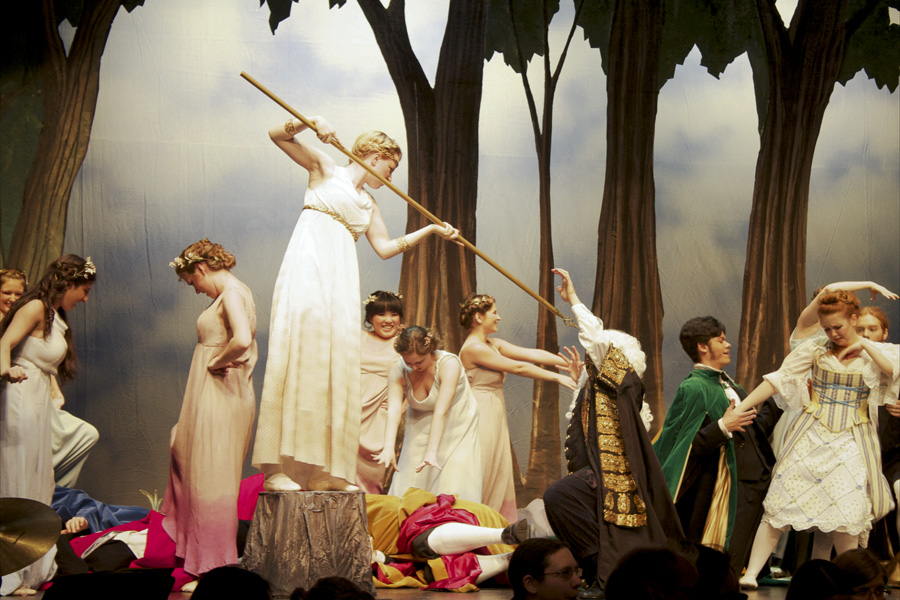As senate reform once again makes its awkward, halting round through this country’s public consciousness, it is perhaps timely to reflect on this peculiar institution’s elder brother: the British House of Lords. No longer a bastion of the hereditary aristocracy—though they still hold a seventh of the seats—the upper chamber of peerage and privilege is nevertheless as ‘undemocratic’ as it has ever been. Many wonder what it is the little Lords do. They check power, review bills, and conduct research? Wonderful! Do they need 800 of them just for that?

(Remi Lu / The McGill Tribune)
With the (at last) creation of the UK Supreme Court in 2009, this critic maintains that the idea of a ‘useful Lord’ is best regarded as a flight of fancy, a magical creature of fairy dust and imagination. Iolanthe, the comic opera by Gilbert and Sullivan, does exactly that. Esteemed peers consort with fairy maidens, and by the end it is impossible to say which group is more absurd. The McGill Savoy Society’s production is delightful, acute, and assuredly accomplished, helping the sharp political commentary go down smoothly with the ambrosia of satire.
Though the aristocracy is a target of ridicule, Iolanthe is at its heart a story of love. Strephon, a lowly shepherd, must contend for the hand of Phyllis with the Lord Chancellor and several Lords of Parliament. An ostensibly unfair fight, Strephon is, in theory, assisted by his half-fairy heritage and his fairy mother, Iolanthe—though this causes significant confusion and turmoil in itself.
Under Emma McQueen’s direction, the impressive cast is notable for their excellent grasp of character. Performers aren’t simply waiting for their turn to speak, but fully take on their roles, frequently charming the audiences with subtle quirks that nevertheless do not distract. Volume is occasionally a problem, and the technical equipment which aims to remedy this appears to only have sporadic effectiveness. However, the actors are mostly able to compensate with clear and nuanced articulation.
As the Queen of the Fairies, Claire Rollans is a staggering presence on stage, one worthy of a true monarch. Rollans’ speech is mesmerizing, evincing both commanding power and soft allure, sometimes in the same sentence. Stefano Saykaly’s Lord Chancellor displays impressive comedic sensibilities, and while sometimes struggling with the challenging patter characteristic of Gilbert and Sullivan, possesses an otherwise radiant voice. The sprightly stepped Strephon, played by Scott Cope, easily wins hearts with his amiable and quirky demeanour.

Led by the bold conductorial gesticulations of music director David Matthew Brounley, Savoy’s orchestra is supremely accomplished, breathing life into Sullivan’s light and melodious score. Maria Mejia’s choreography is intricate, inventive, and often peculiar in the best of ways. Though Alan MacMillan’s lighting is curiously staid and static, Jean Claude Olivier’s set design features impressive paint detail, and successfully conveys the fairy-tale setting. Elizabeth Barter’s costumes range from the ornate robes of the Lord Chancellor to the perhaps-too-barren outfits of the fairies, but all are rightly rich in colour, with the cloaks of the Lords an outright sumptuous visual feast.
Through memorable music and healthy doses of humour, Savoy Society’s Iolanthe turns the often bitter pill of political debate into an immensely pleasurable experience.
The McGill Savoy Society’s production of Iolanthe runs Feb. 21 to 23 at Moyse Hall, 7:30 p.m. with an additional 2:00 p.m. matinee on Feb. 23. Student tickets $12.










Strephon is played in some performances by Gabriel Campagne, and other roles have alternate casting as well – both casts are very strong!
Pingback: Four more performances of Iolanthe left! | The McGill Savoy Society
Pingback: What a fabulous opening weekend! The Press thinks so! | The McGill Savoy Society
Pingback: Iolanthe: Press Reviews | The McGill Savoy Society